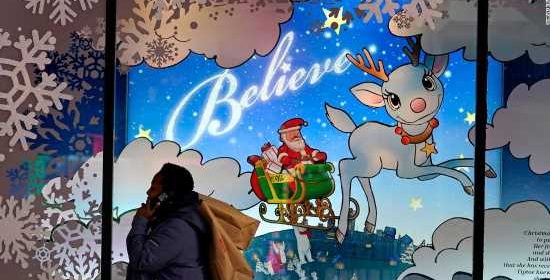Retailers want you to shop in stores this year (and they have a point)

New York (CNN Business)The supply chain crisis means last-minute gift buyers may have little choice but to go shopping the old-fashioned way this holiday season.
High demand, combined with supply chain delays, materials’ shortages and troubles hiring workers, are shrinking the availability of items both online and at stores. As customers get closer to the last minute, physical stores will become a more appealing option for shoppers than waiting around for delivery, analysts expect.
Even if customers can’t find exactly what they’re looking for at a store, it’s usually easier to browse around for an alternative in person — and they can try it on.
“Brick and mortar may be more attractive for consumers later in the season,” Rod Sides, a vice chairman at Deloitte and leader of its US retail and distribution practice, said in an email. “Shoppers can leave with goods in hand, versus waiting on promised dates from shippers.”
Consumers saw more than 2 billion out-of-stock messages while browsing online in October, according to Adobe Analytics. That’s a big reason why, in physical stores, sales will rise by 8% this year — a 10-year high — as shoppers return to in-person shopping and try to avoid shipping delays, according to real estate research firm CBRE.
Analysts also believe buy online, pickup in store orders will boom this holiday because of shipping concerns.
Shoppers will lean on curbside pickup “more than ever to give them peace of mind about their holiday purchases” with wait times and items out of stock high on consumers’ minds, said Andrew Lipsman, a retail analyst at market research firm Insider Intelligence.
Retailers will heavily promote pickup as an option for customers on their websites and mobile apps, in marketing emails, and on television to appeal to customers anxious about buying online late in the season, Lipsman expects.
Stores say they have greater control over inventory in stores and through curbside pickup than they do on home delivery orders — meaning it’s less likely there will be a mistake or delay on an order.
“The closer I got [to the holiday], I would absolutely be using the ship to store because that’s going to give more confidence in being able to actually get the thing in time,” Ben Johns, the general merchandising manager for action sports at outdoor equipment retailer REI, said in a recent interview.
When customers order online and pick up their items in stores, products are either in the store already or REI sends them from one of its warehouses using its own trucks. That means REI doesn’t need to rely on third-party delivery carriers it has less control over to deliver to customers’ homes, he said.
$5 off orders and free blankets
Retailers have an incentive to draw shoppers into their stores.
It’s typically more profitable for retailers to have you shop in person than order to your home because they have to pay expensive last-mile delivery costs. Return rates are also higher for items purchased online, and retailers have to eat the costs for customers’ returns.
Top retailers are pushing customers this year to visit their physical stores to shop or order online and scoop up their items in person.
Kohl’s (KSS) is offering customers $5 off orders when they pick them up in stores. It’s also trying to make the pickup process smoother for customers by adding temporary new pickup locations and more designating parking spots for pickups, as well as a self-pickup test where customers can access their orders using a link and code.
Kohl’s expects increased demand for pickup orders this year in part because it “eliminates the added stress of waiting for packages to arrive on your doorstep,” Paul Gaffney, Kohl’s chief technology and supply chain officer, said in an email.
Carter’s (CRI), the children’s clothing chain, is offering customers gifts as an extra perk if they purchase items on certain days in stores — but not online — such as blankets from November 19 to November 21 and a Skip Hop toy from December 10 to December 12.
Randa Apparel & Accessories, which sells brands such as Levi’s, Tommy Hilfiger, Calvin Klein and others, has shifted a large portion of its advertising spending to push customers to stores, instead of buying online. It’s also directing more of its inventory to stores than e-commerce.
“When inventory is limited, we prefer to drive consumers to in-store purchases over online purchases,” said David Katz, Randa’s chief marketing officer.
Customers purchasing products in stores is more profitable for Randa than online sales, which often come with “very large reverse logistics costs” on return orders. “We’ve paid the tuition for this education, and it was an expensive lesson to learn,” he said.
When shoppers come into stores, they also tend to make impulse purchases or buy related items nearby — belts, for example, near the pants they’re buying. This happens less frequently when buying online.
Overall, Katz said, “the frustration level is lower when you go to mortar and brick, particularly when inventory is limited.”
Source: Read Full Article


